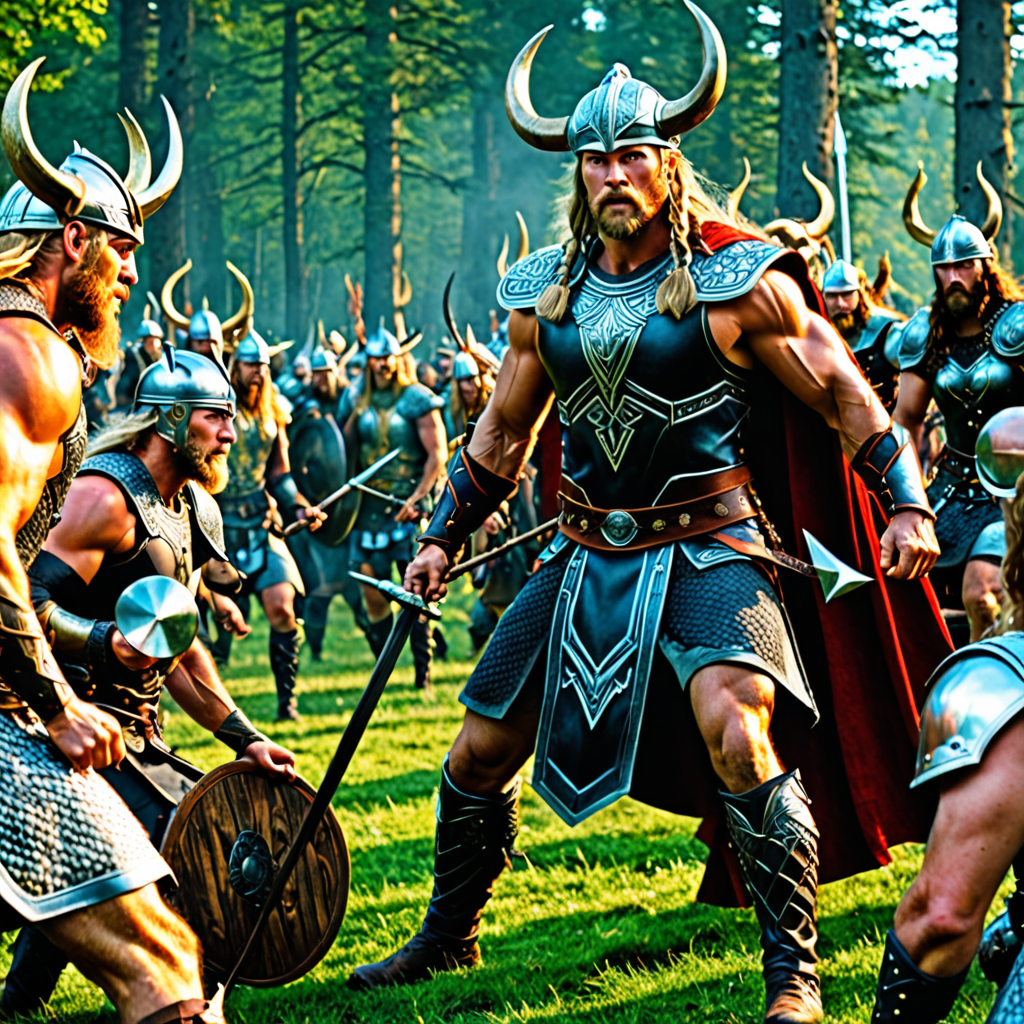The Dragon’s Wisdom: Fafnir’s Knowledge and Prophecy
I. Introduction to Fafnir
Fafnir is a prominent figure in Norse mythology, often depicted as a fearsome dragon whose story intertwines with themes of greed, transformation, and knowledge. He is the son of the dwarf king Hreidmar and is notorious for his insatiable desire for wealth, which ultimately leads to his transformation into a dragon. Fafnir’s narrative encapsulates the archetypal dragon figure in many mythologies, symbolizing not only danger but also ancient wisdom and insight.
Dragons in mythological narratives serve as powerful symbols, representing the primal forces of nature, the unknown, and the consequences of human desire. They often guard treasures of knowledge or material wealth, acting as both obstacles and guides for heroes. This exploration of Fafnir’s wisdom and prophetic capabilities sheds light on the complex interplay between knowledge, power, and human nature within the mythological canon.
II. The Transformation of Fafnir
A. The Story of Fafnir’s Greed and Transformation into a Dragon
Fafnir’s tale begins with the acquisition of a cursed hoard of gold, known as the Andvaranaut, which he and his brother Regin collectively inherit after their father’s death. Consumed by greed, Fafnir becomes increasingly isolated, ultimately murdering Regin for the treasure. This act of treachery marks the turning point in Fafnir’s life, leading to his transformation into a dragon as a physical manifestation of his greed and avarice.
B. The Role of the Cursed Gold in Fafnir’s Fate
The cursed gold plays a pivotal role in Fafnir’s story, representing the corrupting influence of wealth. The gold is tainted by a curse that brings misfortune to its possessors, a common motif in various cultures that illustrates the dangers of greed. Fafnir’s refusal to relinquish the treasure ultimately leads to his downfall, as he becomes a monstrous dragon, embodying the very greed that consumed him.
C. Symbolism of Transformation in Mythological Contexts
Transformation is a recurring theme in mythology, often symbolizing a character’s inner change or the consequences of their actions. In Fafnir’s case, his metamorphosis from a dwarf into a dragon reflects the destructive power of greed and the loss of humanity. This transformation serves as a cautionary tale about the perils of unchecked desire and the potential for individuals to become monstrous when they abandon their principles.
III. The Nature of Dragon Wisdom
A. Characteristics of Dragon Wisdom in Various Cultures
In many cultures, dragons are seen as bearers of ancient wisdom and knowledge. They often possess insights that transcend human understanding, acting as guardians of sacred truths or powerful secrets. This wisdom is frequently accompanied by a sense of foreboding, as the knowledge they offer comes at a great cost. Dragon wisdom is characterized by:
- Profound insight into the nature of existence
- The ability to foresee future events
- Guardianship of hidden treasures or knowledge
B. Fafnir as a Representation of Ancient Knowledge
Fafnir embodies the duality of wisdom and danger. While he possesses vast knowledge accumulated over centuries, his greed has warped this wisdom into a form that is not only dangerous but toxic. Fafnir’s character illustrates that wisdom, when tainted by selfish desires, can lead to destruction rather than enlightenment.
C. The Connection Between Wisdom and Power
The relationship between wisdom and power is complex, particularly in the context of Fafnir’s story. His vast treasure grants him immense power, but it is also the source of his downfall. This illustrates the idea that true wisdom entails understanding the responsibilities that come with power, and that wisdom devoid of ethical considerations can lead to ruin.
IV. Fafnir’s Prophecies
A. Instances of Prophecy Associated with Fafnir
Fafnir’s wisdom extends beyond mere knowledge; it also encompasses prophetic abilities. In the lore, he foretells the fate of heroes and the consequences of their actions. His prophecies are often cryptic, filled with warnings about the dangers of greed and the cyclical nature of fate.
B. Interpretation of Fafnir’s Prophecies in Norse Mythology
Fafnir’s prophecies are interpreted as reflections of the inevitability of fate in Norse mythology. The concept of ‘wyrd,’ or fate, plays a significant role, suggesting that individuals are bound to their destinies, often influenced by their choices and actions. Fafnir’s insights serve as reminders of the interconnectedness of actions and consequences.
C. The Implications of Foresight and Fate in the Narrative
The implications of foresight in Fafnir’s prophecies raise important questions about free will and determinism. While Fafnir offers warnings, the heroes who encounter him must navigate their paths, suggesting that knowledge of fate does not absolve one of responsibility for their actions.
V. The Hero’s Journey: Confronting Fafnir
A. The Tale of Sigurd and His Quest to Slay Fafnir
The most famous encounter with Fafnir is through the hero Sigurd, who embarks on a quest to slay the dragon and claim the cursed treasure. This journey is not merely a physical battle but also a metaphorical confrontation with greed and the darker aspects of human nature.
B. The Significance of the Encounter for the Hero’s Growth
Sigurd’s confrontation with Fafnir serves as a crucial turning point in his hero’s journey. By facing the embodiment of greed and wisdom, Sigurd gains invaluable insights about courage, sacrifice, and the complexity of human desires. The battle is emblematic of the struggle between light and darkness within oneself.
C. Lessons Learned from Confronting the Embodiment of Wisdom
The encounter with Fafnir teaches Sigurd and, by extension, the audience important lessons about the nature of wisdom and the consequences of greed. It emphasizes the idea that true heroism lies not in the pursuit of wealth but in the pursuit of understanding and virtue.
VI. The Legacy of Fafnir’s Knowledge
A. The Impact of Fafnir’s Wisdom on Subsequent Myths and Legends
Fafnir’s legacy has permeated various myths and legends beyond Norse tradition, influencing a wide array of storytelling throughout history. His story serves as a foundational narrative that explores themes of greed, transformation, and the quest for wisdom.
B. Cultural Interpretations of Fafnir’s Knowledge Through History
Throughout history, Fafnir has been reinterpreted in various cultural contexts, reflecting changing societal values and beliefs about wealth and wisdom. His character has inspired countless adaptations in literature, art, and popular media, often serving as a cautionary figure representing the dangers of unchecked ambition.
C. The Enduring Nature of Dragon Lore in Modern Storytelling
Dragon lore continues to thrive in modern storytelling, with Fafnir serving as a quintessential example of the archetypal dragon. Contemporary narratives still explore the themes of wisdom, greed, and transformation, highlighting the timeless relevance of these concepts in human experience.
VII. Lessons from Fafnir’s Wisdom
A. Moral and Ethical Lessons Derived from Fafnir’s Story
Fafnir’s tale offers profound moral and ethical lessons, urging individuals to reflect on their desires and the potential consequences of greed. The narrative emphasizes that wealth and power can corrupt, leading to isolation and destruction.
B. The Balance of Wisdom and Greed in Human Experience
The struggle between wisdom and greed is a central theme in Fafnir’s story. It serves as a reminder that true wealth lies not in material possessions but in the wisdom gained through experiences and the values we uphold.
C. Application of Fafnir’s Lessons in Contemporary Life
In contemporary life, the lessons derived from Fafnir’s wisdom resonate strongly. As society grapples with issues of consumerism, ambition, and ethical considerations, Fafnir’s story encourages individuals to seek a balance between aspirations and moral integrity.
VIII. Conclusion
In conclusion, Fafnir’s significance in Norse mythology is multifaceted, embodying themes of greed, transformation, and the pursuit of wisdom. His legacy continues to resonate, reminding us of the timeless relevance of wisdom and prophecy in our lives. The story of Fafnir serves as a powerful narrative that invites reflection on the nature of human desires and the consequences they entail, reinforcing the enduring legacy of dragons in cultural narratives throughout history.




